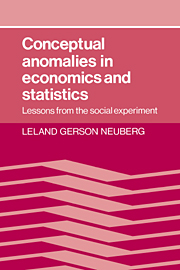Book contents
- Frontmatter
- Contents
- Preface
- Introduction
- PART I STATISTICAL LOGICS
- PART II ECONOMIC LOGICS
- Chapter 5 Problems with a rationalist account of classical mechanics
- Chapter 6 Microeconomics striving to be a classical-mechanics–like science
- Chapter 7 The income maintenance experiments: microeconomic science or scientism?
- Chapter 8 Microeconomics striving to be deontology
- Summary and conclusion of Part II
- Conclusion: Some possible barriers to controlled social experiments as science
- Appendix: Proofs of theorems, lemmas, and propositions
- References
- Symbols and abbreviations
- Index
Chapter 6 - Microeconomics striving to be a classical-mechanics–like science
Published online by Cambridge University Press: 16 February 2010
- Frontmatter
- Contents
- Preface
- Introduction
- PART I STATISTICAL LOGICS
- PART II ECONOMIC LOGICS
- Chapter 5 Problems with a rationalist account of classical mechanics
- Chapter 6 Microeconomics striving to be a classical-mechanics–like science
- Chapter 7 The income maintenance experiments: microeconomic science or scientism?
- Chapter 8 Microeconomics striving to be deontology
- Summary and conclusion of Part II
- Conclusion: Some possible barriers to controlled social experiments as science
- Appendix: Proofs of theorems, lemmas, and propositions
- References
- Symbols and abbreviations
- Index
Summary
Introduction: Addressing some possible objections
In the next two chapters we seek some tentative answers to questions about the nature of microeconomics as science. Is microeconomics science in the same sense as classical mechanics? If not, is it science in some other sense? Were the income maintenance experiments science experiments in some important sense? If microeconomics is not presently science, could it become science? What are the barriers to its becoming science? Does microeconomics face possibly insurmountable barriers to becoming science? Our approach to answering these questions will be first to attempt to reconstruct microeconomics, while noting differences between the developing reconstruction and the previous chapter's account of classical mechanics, and then try to decide if the noted differences demarcate a science from a nonscience. At least two sorts of objections can be raised to our questions and approach to answers.
The first sort of objection runs roughly as follows: Because microeconomics is in fact science like classical mechanics, our first question has been answered in the affirmative, and so our other questions don't apply. Consider, for example, a remark by Popper: “It must be admitted, however, that the success of mathematical economics shows that one social science at least has gone through its Newtonian revolution” (1964, p. 60). Yet Popper never details “the success of mathematical economics”; so his remark is merely a claim, without argument or supporting evidence, that mathematical economics is a science on a par with classical mechanics.
- Type
- Chapter
- Information
- Conceptual Anomalies in Economics and StatisticsLessons from the Social Experiment, pp. 150 - 181Publisher: Cambridge University PressPrint publication year: 1989



